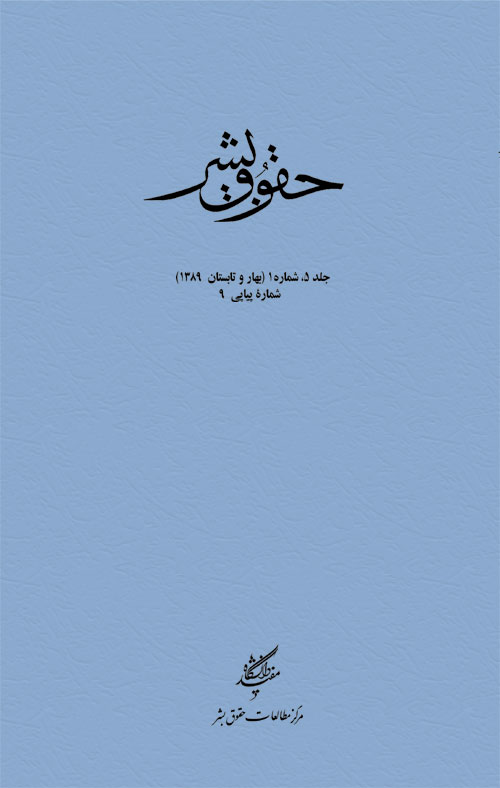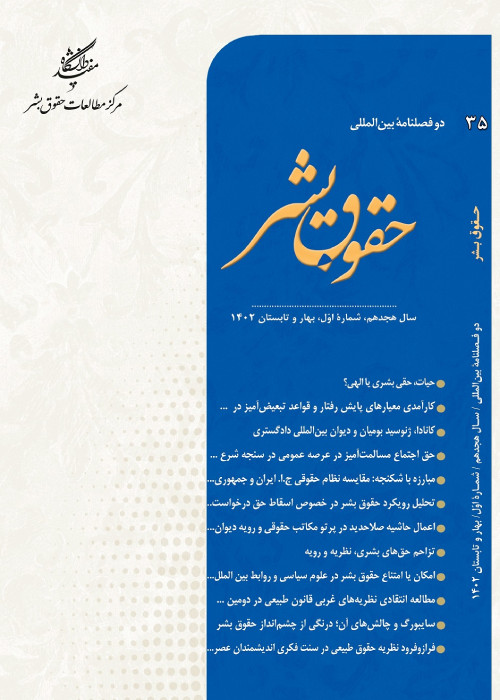فهرست مطالب

نشریه حقوق بشر
پیاپی 9 (بهار و تابستان 1389)
- تاریخ انتشار: 1389/05/27
- تعداد عناوین: 5
-
صفحه 3این مقاله استدلال می نماید که رویکردی به دموکراسی که معرفت شناسی ضد مبناگرایانه را با دیدگاه اخلاقی و سیاسی مشورتی ترکیب می نماید، ما را قادر خواهد ساخت تنش های فزآینده بین مطالبات عام گرایانه حقوق بشر و مطالبات خاص گرایانه استقلال را که از سوی گروه های مختلف فرهنگی مطرح می گردد، حل و فصل نماییم.
برداشت ضد مبناگرایانه از اعتبار اقتدار هنجاری که من ارائه می نمایم، حول محور تمایز بین زمینه های جهانی هنجار محوری و گستره جهانی آن می گردد. این ایده معتقد است که نیروی هنجاری عام گرایانه هنجارها و رویه های ما با اعتراف به دور باطل توجی هات ما محکم و استوار باقی می ماند، بنابراین هم از اشکالات مبناگرایی و هم نسبیت گرایی به دور می ماند.
بحث اصلی این است که تنها با تضمین رویه های خوداندیشانه و فراگیر تصمیم گیری جمعی، ما قادر خواهیم بود تا به تنش های بین جهانشمولی و نسبیت گرایی فرهنگی بپردازیم و الگوهای انعطاف پذیرتری از حاکمیت دموکراتیک، شهروندی و عضویت فرهنگی ایجاد نمائیم که متناسب با چالش های فرآیندهای جهانی تلفیق و تفکیک باشد.کلیدواژگان: ضد مبناگرایی، دموکراسی مشورتی، جهانشمولی، نسبیت گرایی فرهنگی -
صفحه 19این مقاله در صدد ارائه تحلیلی مبتنی بر حقوق بشر از سه مفهوم مرتبط یعنی هویت، کرامت و فرهنگ است و از این تفکر حمایت می کند که اعمال ارزش ها، اصول، هنجارها و معیار های حقوق بشر بین المللی به تمام ابعاد روابط بین هویت، کرامت و فرهنگ و به کار گیری ساز و کارهای حقوق بشر بین المللی در همه آن جوانب، هم برای پیش گیری از تعارض و هم برای ایجاد صلح پس از آن، ضرورت دارد. این مقاله طرفدار این فکر است که به کار گیری این ارزش ها، اصول، هنجارها و معیارهای حقوق بشر بین المللی و به کارگیری سازکارهای حقوق بشر بین المللی در همه ابعاد روابط بین هویت، کرامت و فرهنگ برای حفظ و ارتقاء تنوع فرهنگی و تکثرگرایی در جوامع چند قومی ضروری است.کلیدواژگان: هویت، کرامت، تکثر گرایی، تنوع فرهنگی
-
صفحه 37تحمیل هزینه های غیر ضروری بر بیمار هم با حقوق اولیه بیماران و هم با شان و شرافت ذاتی و تاریخی علم پزشکی و کادر پزشکی منافات دارد و همچنین همه سوگندنامه ها، پندنامه ها، منشورهای اخلاقی پزشکی و... در طول تاریخ کادر پزشکی را ملتزم نموده اند که منافع بیمار را بر منافع خود مقدم بدارند و در تیمار و تسکین آلام بیماران حداکثر مساعی خود را به کار گیرند.
در پدیده سهم خواری، متاسفانه پزشک و یا کادر پزشکی سهم خوار، برخلاف اصول بنیادین همه سوگندنامه های پزشکی از یک طرف و از طرف دیگر بر خلاف شان و شرافت ذاتی حرفه پزشکی، به ضرر بیمار و به نفع خود، به سودجویی غیر اخلاقی می پردازد و اساس اعتماد پزشک بیمار را به شدت مخدوش می نماید.
مطابق نظامات دولتی و مقررات نظام پزشکی جمهوری اسلامی ایران نیز سهم خواری جزء موارد روشن قصور پزشکی بوده و قابل پیگرد سازمانی و حقوقی است، همچنانکه در بسیاری از کدهای اخلاقی ناظر بر عملکرد جامعه پزشکی و در اساسنامه انجمن های پزشکی و قوانین نظام پزشکی در جوامع مختلف نیز موضوع سهم خواری، رفتاری غیراخلاقی و بعضا غیرقانونی در نظر گرفته شده و در پاراگراف پنجم سوگندنامه دانشجویان و پزشکان ایرانی هم بر پرهیز از آزمندی و نگاهبانی دانش پزشکی از سیم و زر تاکید شده است. فتاوی فقهی مراجع تقلید نیز وجوه حاصل از سهم خواری را غیرمشروع می دانند.در اساسنامه انجمن جهانی پزشکی در قسمت مربوط به تعارض منافع از سهم خواری یاد شده و این پدیده مذموم شمرده شده است.کلیدواژگان: سهم خواری، حقوق بیمار، شرافت پزشکی، سوگندنامه های پزشکی -
صفحه 51نویسنده در این مقاله با مرور مباحث صورت گرفته درباره مبانی حقوق بشر، در کمیسیون تدوین کننده پیش نویس اعلامیه جهانی حقوق بشر، خاطر نشان می سازد که به دلیل شرایط آن زمان، اعضای کمیسیون بحث چندانی درباره مبانی نظری حقوق بشر انجام نداند و بحث از آن را به وقت دیگری واگذار کردند. وی ایده غربی بودن اعلامیه حقوق بشر را رد می کند و برعکس، آن را حاصل تعامل فرهنگ ها و سنت های گوناگون می داند. مقاله آنگاه به این پرسش پاسخ می دهد که چگونه ممکن است در فرهنگ های متنوع، حقوق جهانی وجود داشته باشد و در ادامه به تبیین مسابقه برای ساختارشکنی اعلامیه می پردازد و در پایان چالش پیش روی اعلامیه را عدم انسجام آن و وجود معانی و تفسیرهای مختلف از «کرامت» انسان می داند.کلیدواژگان: مبانی حقوق بشر، اعلامیه جهانی حقوق بشر، حقوق جهانی، کرامت انسانی
-
صفحه 69کمال انسان در حیات دنیوی و حتی اخروی ارتباط مستقیم با داشتن محیط زیست سالم است. محیط زیست سالم زمینه ساز سعادت مادی و معنوی بشر است. امروزه تخریب لجام گسیخته محیط زیست (آب، هوا، فضا) حقوق بشر جهانی را با تهدید روبه رو کرده است. اخلاق حفظ محیط زیست دارای اصول و مبانی جهانشمول و مشترک میان ادیان، مکاتب و اندیشمندان فلسفی و حقوقی است. در این مقاله تلاش می شود رابطه میان حقوق بشر با توجه به اخلاق زیست محیطی مورد تجزیه و تحلیل قرار گیرد. بر این اساس سوال اصلی این نوشتار این است که آیا می توان حقوق بشر را از طریق ترویج اخلاق زیست محیطی تحقق بخشید؟ و فرض اصلی این است که از طریق توسعه اخلاق زیست محیطی می توان بهتر به حقوق بشر جهانی دست یافت.کلیدواژگان: حقوق بشر، اخلاق، محیط زیست، اخلاق زیست محیطی
-
Page 3The paper argues that an approach to democracy that combines an anti-foundationalist epistemology and a deliberative political and moral stance will enable us to solve the increasing tensions between the universalistic claims of human rights and the particularistic claims to autonomy coming from different cultural groups. The anti-foundationalist conception of normative authority I put forth is centered on the distinction between universal grounds for and universal scope of normativity. It maintains that the universalistic normative force of our norms and practices remains uncompromised by the acknowledgment of the ultimate circularity of our justifications, thus eschewing the pitfalls of both foundationalism and relativism. My main contention is that only by ensuring inclusive and selfreflexive practices of collective decision-making we will be able to address the tensions between universalism and cultural relativism, and produce more flexible models of democratic governance, citizenship and cultural membership suitable to face the challenges of the global processes of integration and differentiation.Keywords: Anti, Foundationalism, Deliberative Democracy, Universalism, Cultural Relativism
-
Page 19This paper seeks to provide a human rights-based analysis of three inter-related concepts: identity, dignity and culture. It advocates that applying international human rights values, principles, norms and standards to and involving international human rights mechanisms in all aspects of relationships between identity, dignity and culture is essential both for conflict prevention and for post-conflict peace-building. It advocates that applying such international human rights values, principles, norms and standards to and involving international human rights mechanisms in all aspects of relationships between identity, dignity and culture is essential to protect and promote cultural diversity and pluralism in multi-ethnic societies.Keywords: Identity, Dignity, Pluralism, Cultural Diversity
-
Page 37Imposing unnecessary medical and healthcare costs upon patients is in direct contrast with patient rights and the spiritual and historical values of medical practice and it seriously undermines the honor regarding doctors and healthcare teams. All medical oaths and affidavits have repeatedly emphasized on the fact that medical teams and staff must take precedence over the patient’s rights and gains rather than their own. Such oaths clearly state that healthcare imposers must fulfill their duty regarding the patient’s physical and mental comfort. In the event of fee splitting, the medical staff not only neglect and undermine the medical affidavits but also seriously damage the hard gained doctor-patient trust and the historical honor of their profession. Within the law and justice system in practice in the Islamic Republic of Iran, fee splitting in considered unacceptable and illegal and fee splitters may be pursued by law. The same is true in different societies and most medical councils and accepted ethical codes and guidelines. It is clearly stated in the fifth paragraph of the medical affidavit vowed by all Iranian medical students and doctors that fee splitting is considered amoral and even illegal and that healthcare and medical practices are not to be used as a means of gathering wealth for oneself. All Islamic religious leaders have also questioned the lawfulness of money and wealth earned by fee splitting. The act of fee splitting is also recognized as unethical and unlawful in the guidelines and codes affected by universal medicine societies.Keywords: Fee Splitting, Patient rights, Medical honor, Medical Oaths
-
Page 51Reviewing the discussions on the foundations of human rights that took place in the U.N.'s first Human Rights Commission to draft the 1948 Universal Declaration of Human Rights, the author points out that the Commissioners, due to the situation at that time, had few discussions on the foundations of human rights and left the problem of foundations for another day. She rejects the idea that the Universal Declaration is western believing that all effective cultures in the world had a creative hand in the shaping of the document. The article then answers the question that how there can be universal rights in diverse cultures. It continues to explain the derby to deconstruct the Declaration and in the end concludes that the challenge of the Declaration is its incoherence and the different meanings and interpretations of human “dignity”.Keywords: Foundations of Human Rights, Universal Declaration of Human Rights, Universal Rights, Human Dignity
-
Page 69Happiness of human beings in his/her worldly life and even the hereafter has direct contact with the environment’s health. Healthy environment is central to the worldly and spiritual human prosperity. Today, the unbridled destruction of the environment (water, air, space) is threatening the universal human rights. The ethics protecting environment has universal foundations and principles which are shared by religions as well as legal and philosophical scholars. This article tries to deal with the relationship between human rights and environmental ethics. The main question this research is going to answer is whether human rights can be realized through the promotion of environmental ethics. The main premise of this paper is that through the development of environmental ethics, universal human rights can be better achieved. The research method of this paper is descriptive – analytical by using library tools.Keywords: Human rights, Ethics, Environment, Environmental ethics


